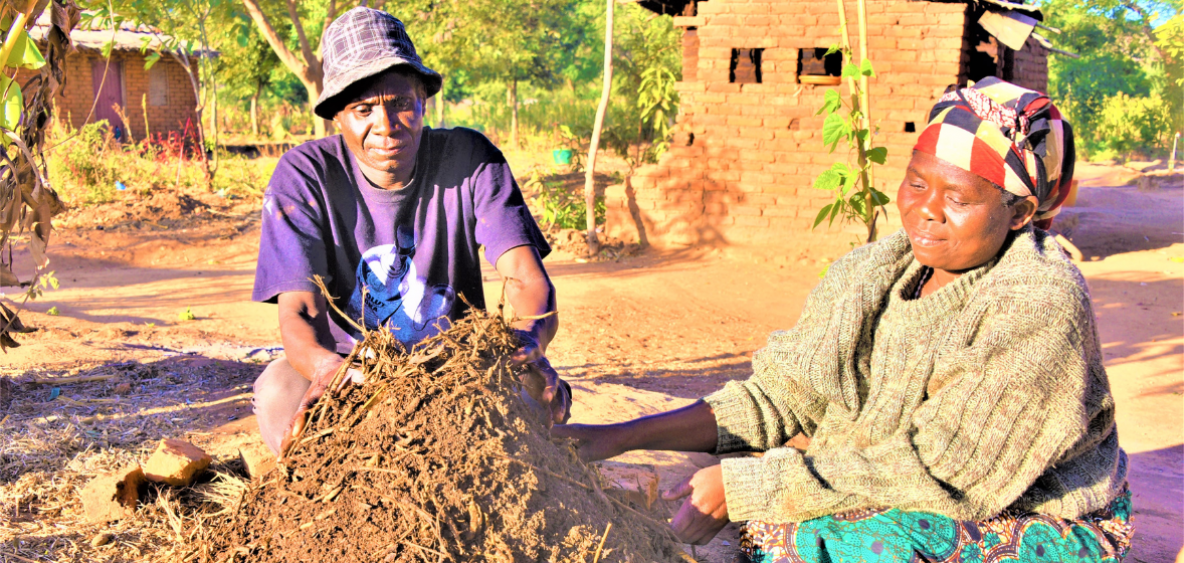 Janet and Robert Munthali. Credit: Felix Malamula (PRIDE)
Janet and Robert Munthali. Credit: Felix Malamula (PRIDE) Farmers Janet and Robert Munthali have found a stinky solution to increasing their agricultural productivity and household income in a sustainable way.
Increasing household wealth for small-holder farming families is often challenged by reduced crop yields. This is due to factors that affect production like climate change, expensive farm inputs (e.g., fertilizer) and a lack of access to new farming technologies.
These challenges have made achieving food and income security a rare feat for many families over the years. But it hasn’t been impossible.
“Every problem has a solution,” says Janet Munthali, who lives in Bamantha village in Rumphi, a region of Paramount Chief Chikulamayembe. “The coming of the Programme for Rural Irrigation Development (PRIDE) with extension messages on good agriculture practices which included crop diversification and manure making, ended our long-time challenges of achieving food and income security at household level.”
Munthali and her husband were all smiles while they shared how they have managed to accumulate and grow their wealth over the past four years. Since they started making and applying a manure mixture onto their crop fields under PRIDE, part of the Resilient Food Systems (RFS) Malawi project, led by the International Fund for Agricultural Development (IFAD) things have changed for the family.
By harnessing the benefits of applying the manure mixture, the family further switched from mono-crop agriculture to growing different crops, thus increasing their farm income and spreading diversifying economic risk in the case of crop failure. The innovative practices have assisted the two and their children build their domestic economy, improve their household nutrition and create employment opportunities within their community.
“In the past years before we were trained on manure making and application, our harvests averaged from 10 to 15 (50kg) bags of maize per 0.4-hectare field. We were mainly growing maize and groundnuts on small field. After the training and other support from PRIDE, we started making manure with locally available materials, diversified our crop production and developed a five-year vision for our family”, explained Janet Munthali.
The Munthali family, and now others in the
surrounding communities, make and apply Mbeya
and Bokash
manure using ingredients such as water, soil, soybean husks, maize bran, animal
waste, ash, maize stalks and groundnuts husks, and even small amounts of Urea
fertilizer in the case of Mbeya manure.
They have seen and reaped the benefits from applying manure to their farmlands, like improved soil fertility, structure and moisture content, all at an affordable cost; consequently, increasing yield and income.
Echoing the sentiments of his wife, Mr Munthali says the use of manure has greatly transformed their lives. They are now a home with enough food, adequate financial resources to meet their basic needs, including paying for their children’s school fees, and are now able to make some domestic developments. He further mentioned that another secret to their success has been working together as a family and including their children in the process.
“We have achieved and reached this far also because we do things together as a family. We sat down all of us, myself, my wife and children and developed a five-year vision (2019 – 2023) for our home. The vision included construction of a decent house, buying a motorcycle and help the children complete their studies. To achieve this vision, use of cheap farming inputs like manure, crop diversification and village savings and loans have been our ways and means,” – Robert Munthali
The Munthali family now grows paprika, groundnuts and soybean as cash crops in addition to maize and sweet potatoes, which they mostly depend on for household food. This past season, they harvested 120 tins of unshelled groundnuts which they are selling at MK 5000 apiece, 1500 kgs of paprika for sale at MK 1200 per kg, and have generated over MK500, 000 from soybean sales which they put towards completing works on their home. They have also invested MK 100 000 into village savings and loans.
Farmers in the RFS Malawi project sites are always supported to innovate their agricultural practices that centre on crop diversity, and the use of manure to optimize crop yield with cheap inputs sure doesn’t hurt.
Food insecurity stinks, but so might the solution.
Subscribe to our monthly newsletter to receive updates on stories directly from the field across all our projects, upcoming events, new resources, and more.